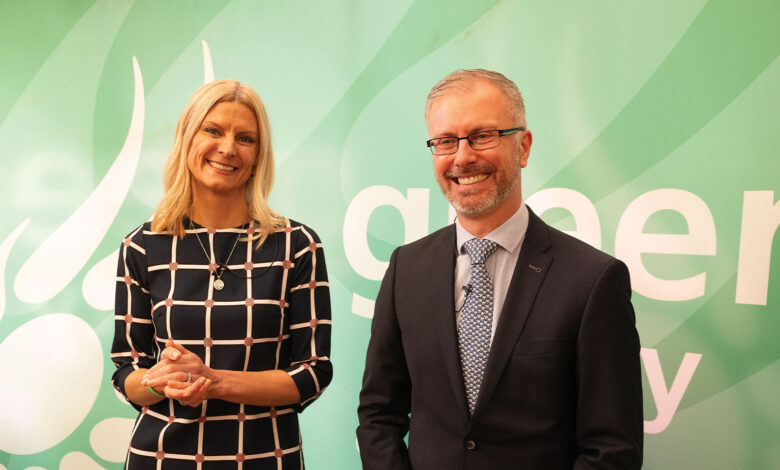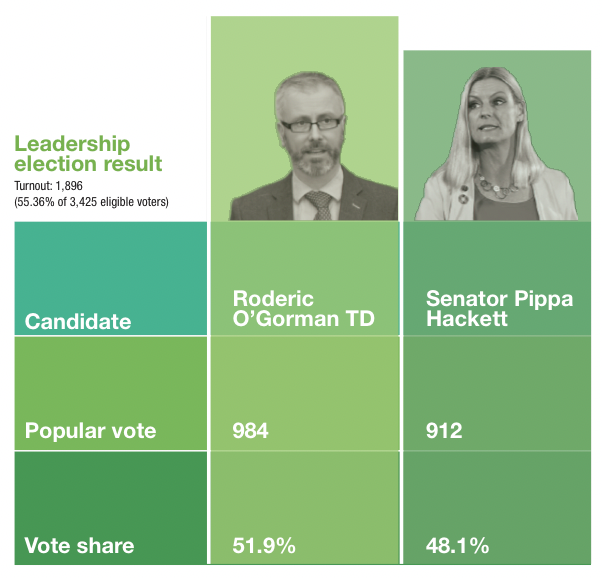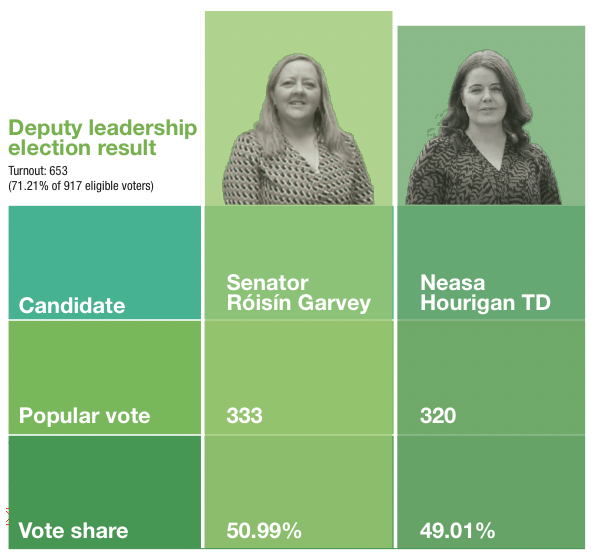O’Gorman pips Hackett to Green Party leadership

For the first time since 2011, the Green Party has a new leader following Roderic O’Gorman TD’s leadership election victory over Senator Pippa Hackett.
O’Gorman has pledged to unite the Green Party “focus on delivering the final parts of the Programme for Government and entering into the general election campaign”.
O’Gorman – the Minister for Children, Equality, Disability, Integration and Youth – narrowly defeated Minister of State and Senator Pippa Hackett, winning 51.9 per cent of the vote to Hackett’s 48.1 per cent.
While the Green Party’s powers are at an all-time high – holding four cabinet portfolios and 12 TDs – it has recently experienced poor results in the local and European elections, as well as consistent poor standing in opinion polls, which may explain why only 1,896 of the party’s registered 3,425 members (around 55 per cent) voted in this election, a drop from the 67 per cent turnout recorded in the 2020 leadership election.
In an interview with eolas Magazine, Eamon Ryan TD, who served as Green Party leader for 13 years, acknowledged that while the election results were “not terrible”, that he had “been hoping to do better”.
“We ran a good campaign, but the tide – like a lot of places in Europe – is slightly waning on environmental justice in this last year or so. That will turn and come back in, but it was difficult,” Ryan said.
A Green Party member for 24 years, O’Gorman’s election in 2020 followed unsuccessful general election attempts in 2007, 2011, and 2016. He was, however, successful in winning a seat in Fingal County Council in 2014 and 2019.
First elected to the Dáil in 2020 in the Dublin West constituency aged 39, O’Gorman went straight into cabinet as Minister for Children, Equality, Disability, Integration and Youth.
As Minister – a job he retains following his assumption of leadership – O’Gorman has overseen the rollout of the Magdalen Restorative Justice Ex-Gratia Scheme, published A White Paper to End Direct Provision and to Establish a New International Protection Support Service – aiming to phase out the State’s direct provision model by 2024 – and introduced community integration services.
Speaking to eolas Magazine, O’Gorman’s predecessor, Eamon Ryan TD praised his successor’s contribution as Minister: “What Roderic has done in terms of improving childcare in the country is a historical change.”
The effectiveness of some of these measures, however, is doubtful, with direct provision still in place and with community integration measures having been unsuccessful as hate crimes and hate-related incidents have increased by 22.8 per cent since he became minister, as the Green Party has borne the brunt of public criticism for record levels of immigration under its triparty coalition with Fine Gael and Fianna Fáil.
During his leadership campaign, O’Gorman said that he was willing to explore the formation of a “progressive alliance” between the Green Party and other parties on the soft left such as the Labour Party and Social Democrats, although notably not including Sinn Féin or any parties on the far-left. Combined, the Green Party, Labour, and the Social Democrats hold 25 seats in the Dáil.
The new Green Party leader confirmed that there will be no reshuffle of the party’s ministers, meaning that the outgoing leadership team of Eamon Ryan TD and Catherine Martin TD are likely to remain in their ministerial positions until the 33rd Dáil is dissolved.
Succeeding Martin as deputy leader – in an election held on the same day in the immediate aftermath of the leadership election – is Senator Róisín Garvey, who defeated Neasa Hourigan To who won 333 votes to Hourigan’s 320 votes, giving her a winning margin of 13 votes. Minister of State Ossian Smyth TD had announced his intention to run, but withdrew upon O’Gorman’s election, saying the deputy leader “should be a woman”.
A former employee of An Taisce, Garvey was a councillor in Clare County Council from 2019 to 2020, before her appointment to the Seanad after the 2020 election, when she was an unsuccessful candidate in the Clare constituency, albeit with a respectable first-preference vote share of 9.5 per cent.







